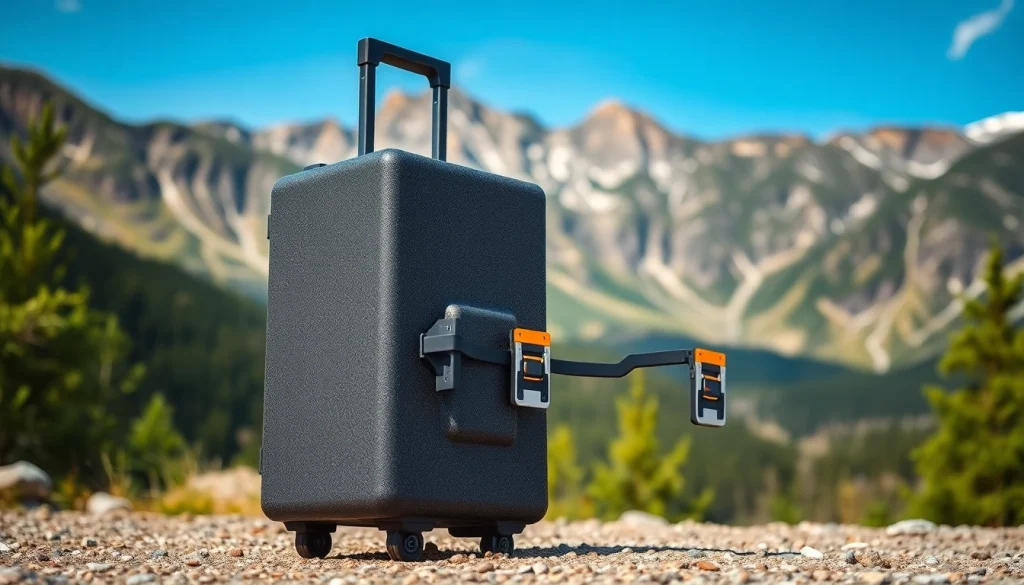Choosing the Right Wheeled Hard Case for Equipment: A Guide to Durability and Functionality

Understanding the Importance of a Wheeled Hard Case for Equipment
For professionals and enthusiasts in various fields, ensuring the safety and security of equipment during transport is paramount. One of the best solutions for this need is a wheeled hard case for equipment. These cases are constructed to shield valuable items from impact, moisture, and dust while providing effortless mobility thanks to their wheeled design. This article delves into the numerous benefits of using wheeled hard cases, essential features to consider, maintenance tips, popular models, and customization options available to suit individual needs.
What Is a Wheeled Hard Case?
A wheeled hard case is a protective storage solution designed for transporting equipment, tools, and fragile items. Unlike standard soft cases or bags, hard cases are made from robust materials such as polycarbonate, aluminum, or heavy-duty plastic, ensuring excellent protection against external elements. The addition of wheels and a telescoping handle transforms these cases into mobile units, ideal for travel, whether you’re heading to the airport, a construction site, or storing gear in a vehicle.
Key Benefits of Using a Wheeled Hard Case
The benefits of wheeled hard cases are extensive, making them an essential choice for anyone who needs to safeguard their equipment.
- Durability: Hard cases are built to withstand harsh conditions, from extreme temperatures to impacts that could damage sensitive equipment.
- Protection: With the capability to seal out moisture and dust, these cases provide an excellent fortress for your gear.
- Mobility: The wheels facilitate easier transportation, significantly reducing the effort needed to carry bulky items over various terrains.
- Organization: Many models come with customizable foam inserts or compartments that help keep equipment organized and prevent shifting during transit.
Common Uses for Wheeled Hard Cases
These cases are versatile and find applications in a multitude of settings, including:
- Photography: Photographers use wheeled hard cases to transport cameras, lenses, and accessories securely.
- Medical Equipment: Healthcare professionals rely on these cases to ensure medical devices remain safe while traveling to patients or between facilities.
- Electronics: Companies handling electronic equipment often use hard cases to protect fragile tech items during transport.
- Tools and Industrial Equipment: Construction and maintenance professionals depend on wheeled hard cases for safe transport of tools and equipment on site.
Features to Consider When Selecting a Wheeled Hard Case for Equipment
When choosing the right wheeled hard case, several key features should be evaluated to ensure it meets your specific needs.
Material Durability and Protection Levels
The material of the case plays a significant role in its durability and protective capabilities. Polycarbonate cases tend to be lighter yet incredibly strong, while aluminum options provide superior protection but at a higher weight. Look for cases that have an IP (Ingress Protection) rating, indicating their resistance to dust, moisture, and other environmental factors.
Wheeled Systems: Two-Wheel vs. Four-Wheel
Choosing between two-wheel and four-wheel designs can impact ease of use. Two-wheel cases are great for rolling over uneven surfaces, requiring the user to tilt the case slightly. However, four-wheel cases provide 360-degree maneuverability, making them ideal for navigating tight spaces or crowded areas. Consider your environment and how frequently you’ll be shifting the case to make the best choice.
Size and Internal Configuration Options
Evaluation of size and internal configurations is crucial. A case should be adequately sized to fit your equipment snugly, minimizing movement during transportation. Internal configurations such as customizable foam, dividers, or padded inserts aid in protecting individual components from shock and impact during transit. Always choose a case that allows the flexibility to adapt to your changing storage needs.
Best Practices for Maintaining Your Wheeled Hard Case for Equipment
To ensure longevity and optimal performance of a wheeled hard case, routine maintenance and care are necessary.
Cleaning and Care Tips
Cleaning your wheeled hard case should be a regular practice. Use a damp cloth to wipe down the exterior, removing dust and grime. For tougher stains, a mild detergent may be used. Avoid harsh chemicals that could damage the case’s finish. Regularly inspect and clean the wheels to ensure effortless mobility.
How to Store Your Wheeled Hard Case
Proper storage is essential to prolonging the lifespan of your case. When not in use, store the case in a cool, dry place away from direct sunlight and extreme temperatures. This prevents warping or degradation of the case materials. If storing for an extended period, consider keeping it empty to avoid unnecessary pressure on the interior components.
Inspecting for Damage and Wear
Before each use, inspect your wheeled hard case for any signs of wear or damage. This includes checking for cracks, frayed seals, or compromised wheels. Address any issues immediately to avoid further damage during transportation, and keep any repairs as part of your maintenance routine.
Top Brands and Models of Wheeled Hard Cases
Although the following section discusses popular options, it’s essential to remember that individual requirements should guide your selections.
Benchmarking Against Competitors
When evaluating various brands of wheeled hard cases, comparing features, pricing, and reviews is vital. Focus on cases that have demonstrated a history of reliability and sturdiness. Many options in the market offer various levels of comfort and usability, so thorough research is critical in finding the right fit for your needs.
Affordable Options vs. Premium Choices
The market is flooded with wheeled hard cases at different price points. Affordable models may suffice for casual users or light applications but could lack the durability required for daily professional use. Premium cases tend to offer better materials, warranty packages, and overall longevity, making them an investment worth considering for heavy users.
User Reviews and What They Tell You
Reading user reviews can provide credible insights into the performance and reliability of specific models. Look for cases that consistently receive high ratings and positive comments regarding durability, functionality, and customer support. A model that excels in user feedback often reflects a well-made product that meets or exceeds expectations.
Customizing Your Wheeled Hard Case for Equipment
Customizing your wheeled hard case can significantly enhance its usability and make it more personal to your needs.
Foam Inserts and Organizational Tools
Many manufacturers offer foam inserts that can be customized to fit specific equipment. These inserts not only help organize components but also provide shock absorption, protecting items from impact. Organizational tools such as dividers, straps, or mesh pockets can further improve the case’s functionality, making it easier to access and store equipment.
Branding and Personalization Options
For businesses, adding branding options such as logos can transform a basic wheeled hard case into a professional representation of your brand. Many manufacturers provide custom printing services for adding logos or specific messages, increasing visibility while providing protection.
Accessories to Enhance Functionality
Consider additional accessories that can complement and enhance your wheeled hard case. Items such as padlocks for security, rain covers for weather protection, or even specialized wheels for different terrains can be purchased to improve overall functionality and adaptability of your case.
Conclusion
Choosing the right wheeled hard case for equipment is crucial for anyone looking to protect their valuable tools, gadgets, or sensitive items during transport. With the right features, materials, and maintenance, these cases can provide dependable protection and mobility. By evaluating your specific needs, understanding the available options, and considering customization, you can ensure that your equipment remains safe and secure on every journey.







